简易英文版英国介绍
- 格式:ppt
- 大小:4.12 MB
- 文档页数:79
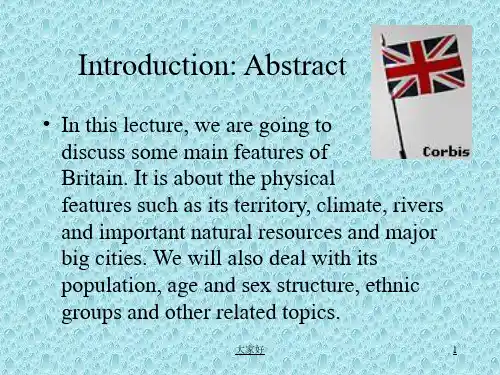
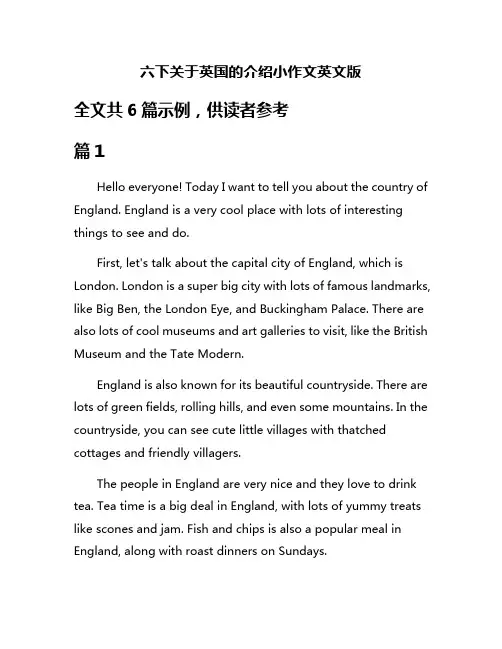
六下关于英国的介绍小作文英文版全文共6篇示例,供读者参考篇1Hello everyone! Today I want to tell you about the country of England. England is a very cool place with lots of interesting things to see and do.First, let's talk about the capital city of England, which is London. London is a super big city with lots of famous landmarks, like Big Ben, the London Eye, and Buckingham Palace. There are also lots of cool museums and art galleries to visit, like the British Museum and the Tate Modern.England is also known for its beautiful countryside. There are lots of green fields, rolling hills, and even some mountains. In the countryside, you can see cute little villages with thatched cottages and friendly villagers.The people in England are very nice and they love to drink tea. Tea time is a big deal in England, with lots of yummy treats like scones and jam. Fish and chips is also a popular meal in England, along with roast dinners on Sundays.One thing you might not know about England is that the weather can be a bit rainy. But don't worry, because there are lots of fun indoor activities to do, like going to the cinema or shopping in cute little boutiques.So, if you ever get the chance to visit England, make sure you see all the amazing sights, eat delicious food, and meet friendly people.England is a fantastic place to visit and I'm sure you'll have a great time there!篇2Hello everyone! Today, I want to tell you about a country called England. England is a part of the United Kingdom, which also includes Scotland, Wales, and Northern Ireland.First, let's talk about the weather. In England, it can be quite rainy and foggy. But don't worry, because on sunny days, you can enjoy beautiful parks and gardens. Some famous parks in England are Hyde Park in London and the Peak District National Park in Derbyshire.Next, let's talk about the food. In England, people love to eat fish and chips, which is fried fish with potato fries. They also enjoy a traditional English breakfast, which includes eggs, bacon, sausage, beans, and toast. Yummy!Now, let's talk about the landmarks. England is home to many famous landmarks, such as Big Ben, the Tower of London, and Buckingham Palace. You can also visit Stonehenge, a mysterious prehistoric monument in Wiltshire.Lastly, let's talk about the people. English people are known for being polite and friendly. They love to drink tea and watch football. They also have a funny accent, which you might find interesting!In conclusion, England is a beautiful country with a rich history and culture. I hope you enjoyed learning about England. Thank you for listening!篇3Sure! Here is a simple and informal introduction to England written in a childlike manner:Hi there! Today, I want to tell you all about England! England is a super cool country in Europe. It's a famous part of the United Kingdom, along with Scotland, Wales, and Northern Ireland.First off, let's talk about the weather in England. It's pretty chilly most of the time, and it rains a lot. But that's okay, becauseit makes everything look so green and pretty! Plus, you get to wear cool rain boots and jump in puddles.Next, let's chat about English traditions. One of my favorites is tea time! The English love their tea, and they even have fancy afternoon tea parties with yummy sandwiches and cakes.Oh, and let's not forget about the famous landmarks in England. There's Big Ben, the London Eye, and Buckingham Palace where the Queen lives! It's like a real-life fairy tale.And of course, England is known for its delicious fish and chips, bangers and mash, and yummy pies. The food is so good, you'll want to try everything!So, if you ever get the chance to visit England, make sure to say hello to the Queen, eat lots of delicious food, and enjoy the beautiful sights. It's a magical place that you won't want to leave!That's all for now, friends! Thanks for listening to my little chat about England. See you next time! Bye-bye!篇4Hello everyone! Today, I want to tell you all about the amazing country of Britain!Britain is a very special place with lots of cool things to see and do. It's located in Europe and is made up of four countries –England, Wales, Scotland, and Northern Ireland.First, let's talk about England. England is famous for its capital city, London. In London, you can see Big Ben, the Tower of London, and Buckingham Palace. There are also lots of delicious foods to try, like fish and chips and scones with clotted cream. Yum!Next, we have Wales. Wales is known for its beautiful green countryside and historic castles. One famous castle is called Cardiff Castle, which is located in the capital city of Cardiff.Now, let's chat about Scotland. Scotland is famous for its stunning landscapes, like the Highlands and Loch Ness. You can also see the famous Edinburgh Castle and try their yummy haggis dish.Last but not least, we have Northern Ireland. Northern Ireland is known for its Giant's Causeway, a natural wonder made up of thousands of hexagonal rock columns. You can also visit Belfast, the capital city, and learn about the Titanic's history.In conclusion, Britain is a wonderful place to visit with so much to see and do. I hope you all get the chance to visitsomeday and experience the magic of this special country. Thank you for listening!篇5Hello everyone! Today I want to tell you all about Britain, which is a super cool country!First of all, Britain is made up of four countries: England, Scotland, Wales, and Northern Ireland. They all have their own flags and traditions, just like different provinces in China.In Britain, the weather can be a bit rainy sometimes, but when the sun comes out, it's really beautiful! There are lots of green fields and pretty flowers everywhere. And did you know that there are castles and palaces all over the place? It's like a fairy tale!One of the most famous things about Britain is the Queen. Her name is Queen Elizabeth II, and she lives in a big palace called Buckingham Palace. She wears fancy clothes and has lots of jewels, just like a princess!Another cool thing about Britain is the food. They eat fish and chips, which is really yummy, and they also have a special tea time where they eat scones with cream and jam. It's so delicious!There are also famous landmarks in Britain, like Big Ben, which is a really tall clock tower, and Stonehenge, which is a mysterious circle of rocks. It's like something out of a movie!I hope you learned a lot about Britain from my little introduction. It's such an amazing country, and I can't wait to visit there someday! Bye bye!篇6Hello everyone! Today I'm going to tell you about a very special country called England.England is a country in Europe and it is part of the United Kingdom. The capital of England is London, which is a very big city with lots of famous landmarks like Big Ben, the Tower of London, and Buckingham Palace.One of the things England is known for is its royal family. The queen of England is Queen Elizabeth II. She lives in Buckingham Palace and has been the queen for a very long time.England is also famous for its beautiful countryside. There are rolling green hills, charming villages, and stunning coastline. One of the most famous natural landmarks in England is Stonehenge, which is a mysterious circle of ancient stones.English people are known for being polite and like to drink tea. They also love sports like football (soccer), cricket, and rugby. The English countryside is dotted with cozy pubs where people can enjoy a pint of beer and some traditional British food like fish and chips.Overall, England is a beautiful and fascinating country with a rich history and culture. I hope you enjoyed learning a bit about it! Thank you for listening!。
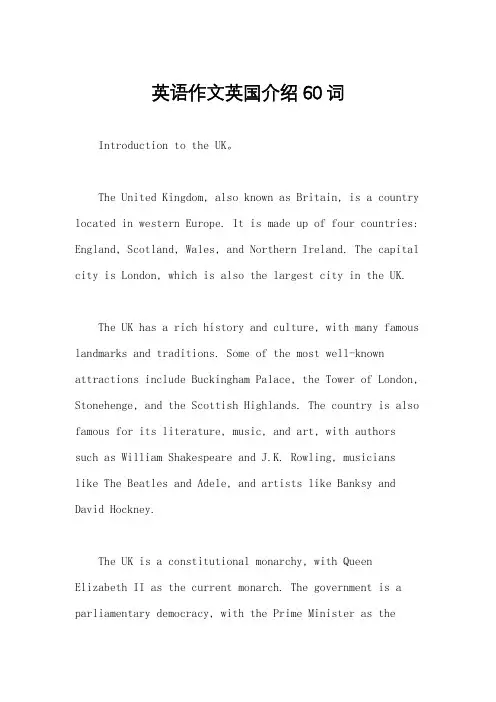
英语作文英国介绍60词Introduction to the UK。
The United Kingdom, also known as Britain, is a country located in western Europe. It is made up of four countries: England, Scotland, Wales, and Northern Ireland. The capital city is London, which is also the largest city in the UK.The UK has a rich history and culture, with many famous landmarks and traditions. Some of the most well-known attractions include Buckingham Palace, the Tower of London, Stonehenge, and the Scottish Highlands. The country is also famous for its literature, music, and art, with authors such as William Shakespeare and J.K. Rowling, musicianslike The Beatles and Adele, and artists like Banksy and David Hockney.The UK is a constitutional monarchy, with Queen Elizabeth II as the current monarch. The government is a parliamentary democracy, with the Prime Minister as thehead of government. The official language is English, andthe currency is the pound sterling.The UK is a diverse and multicultural country, with a population of over 66 million people. The people of the UK are known for their politeness and sense of humor, as well as their love of tea and football.In terms of education, the UK has some of the best universities in the world, including the University of Oxford and the University of Cambridge. The country is also home to many prestigious boarding schools, such as Eton College and Harrow School.Overall, the UK is a fascinating and vibrant countrywith a rich history and culture. It is a populardestination for tourists and students alike, and offers many opportunities for learning, exploration, and adventure.。
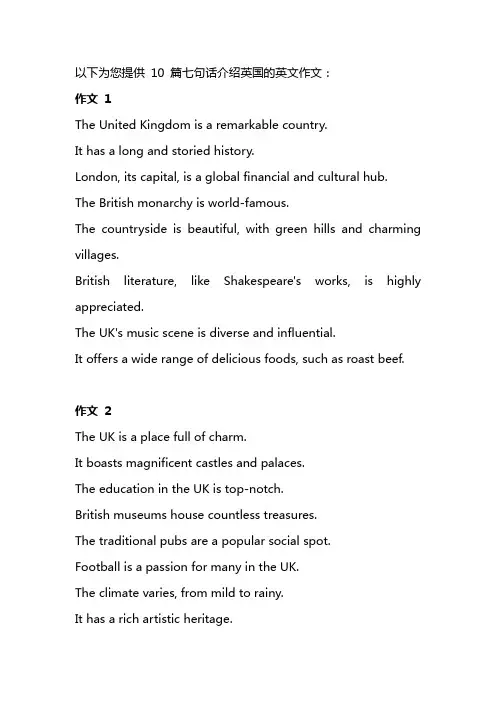
以下为您提供10 篇七句话介绍英国的英文作文:作文1The United Kingdom is a remarkable country.It has a long and storied history.London, its capital, is a global financial and cultural hub.The British monarchy is world-famous.The countryside is beautiful, with green hills and charming villages.British literature, like Shakespeare's works, is highly appreciated.The UK's music scene is diverse and influential.It offers a wide range of delicious foods, such as roast beef.作文2The UK is a place full of charm.It boasts magnificent castles and palaces.The education in the UK is top-notch.British museums house countless treasures.The traditional pubs are a popular social spot.Football is a passion for many in the UK.The climate varies, from mild to rainy.It has a rich artistic heritage.作文3The United Kingdom attracts people from all over. Its architecture ranges from ancient to modern.The UK is a leader in scientific research.British fashion is stylish and trendy.The national parks offer stunning natural beauty. The legal system is well-established and respected. Festivals like Christmas are celebrated joyously.It has a strong healthcare system.作文4The UK is known for its politeness and etiquette.It has some of the oldest universities in the world. The Royal Air Force is highly regarded.British gardens are renowned for their beauty.The public transportation system is convenient.The UK has made significant contributions to cinema. Its royal ceremonies are grand and spectacular.It's a great destination for shopping.作文5The United Kingdom has a diverse culture.It is home to many famous musicians and bands.The UK's cuisine offers a variety of choices.The historic towns are full of character.The National Health Service provides essential care. British comedy is known for its wit and humor.The UK has beautiful beaches along its coastlines.It is a country of innovation.作文6The UK is a land of traditions.It has excellent libraries and archives.The UK's military has a proud history.British art galleries showcase masterpieces.The rural landscapes are peaceful and serene.The education system emphasizes quality and creativity. The royal family plays a symbolic role.It is a haven for book lovers.作文7The United Kingdom is a tourist paradise.It has world-class museums and galleries.The UK's literature has inspired generations.The cities are vibrant and full of life.The countryside is ideal for outdoor activities.British theater is renowned for its quality performances. The UK is famous for its tea culture.It has a rich maritime history.作文8The UK is a country of contrasts.It has ancient ruins and modern skyscrapers.The UK's sports events draw global attention.British folklore is fascinating.The industrial heritage is significant.The education standards are high.The royal palaces are magnificent.It is a nation of inventors and explorers.作文9The United Kingdom has a global influence.It has stunning cathedrals and churches.The UK's fashion shows are glamorous.The natural reserves are home to diverse wildlife.The transport links are efficient.British cuisine is evolving and becoming more diverse. The UK is a center for music festivals.It has a strong sense of community.作文10The UK is a historical treasure trove.It has beautiful lakes and rivers.The UK's scientific achievements are remarkable. British customs and traditions are deeply rooted. The coastal towns are charming.The education opportunities are vast.The royal weddings are grand affairs.It is a country that values heritage.。
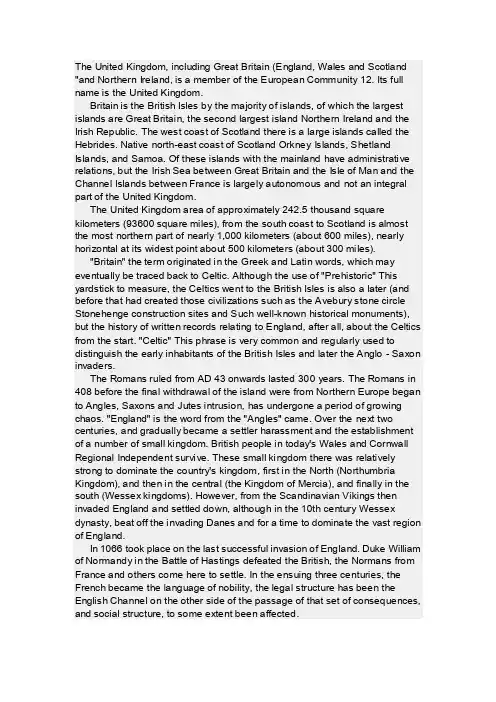
The United Kingdom, including Great Britain (England, Wales and Scotland "and Northern Ireland, is a member of the European Community 12. Its full name is the United Kingdom.Britain is the British Isles by the majority of islands, of which the largest islands are Great Britain, the second largest island Northern Ireland and the Irish Republic. The west coast of Scotland there is a large islands called the Hebrides. Native north-east coast of Scotland Orkney Islands, Shetland Islands, and Samoa. Of these islands with the mainland have administrative relations, but the Irish Sea between Great Britain and the Isle of Man and the Channel Islands between France is largely autonomous and not an integral part of the United Kingdom.The United Kingdom area of approximately 242.5 thousand square kilometers (93600 square miles), from the south coast to Scotland is almost the most northern part of nearly 1,000 kilometers (about 600 miles), nearly horizontal at its widest point about 500 kilometers (about 300 miles)."Britain" the term originated in the Greek and Latin words, which may eventually be traced back to Celtic. Although the use of "Prehistoric" This yardstick to measure, the Celtics went to the British Isles is also a later (and before that had created those civilizations such as the Avebury stone circle Stonehenge construction sites and Such well-known historical monuments), but the history of written records relating to England, after all, about the Celtics from the start. "Celtic" This phrase is very common and regularly used to distinguish the early inhabitants of the British Isles and later the Anglo - Saxon invaders.The Romans ruled from AD 43 onwards lasted 300 years. The Romans in 408 before the final withdrawal of the island were from Northern Europe began to Angles, Saxons and Jutes intrusion, has undergone a period of growing chaos. "England" is the word from the "Angles" came. Over the next two centuries, and gradually became a settler harassment and the establishment of a number of small kingdom. British people in today's Wales and Cornwall Regional Independent survive. These small kingdom there was relatively strong to dominate the country's kingdom, first in the North (Northumbria Kingdom), and then in the central (the Kingdom of Mercia), and finally in the south (Wessex kingdoms). However, from the Scandinavian Vikings then invaded England and settled down, although in the 10th century Wessex dynasty, beat off the invading Danes and for a time to dominate the vast region of England.In 1066 took place on the last successful invasion of England. Duke William of Normandy in the Battle of Hastings defeated the British, the Normans from France and others come here to settle. In the ensuing three centuries, the French became the language of nobility, the legal structure has been the English Channel on the other side of the passage of that set of consequences, and social structure, to some extent been affected.Wales, though often in England within the sphere of influence, but has been a bastion of Boston. However, in the Prince Llewellyn was killed in 1282, after Edward I waged a battle and victory to put England under the rule of Wales. Welsh nationalist sentiment continues to rise, the beginning of the 15th century rebellion led by Owen Gerlind illustrated this point. In 1536 and in 1542 a joint decree to England and Wales in the administrative, political and legal integration into one.Originally lived in Scotland most of Picts. The 6th century, the Scots from Ireland to settle in today's Argyll area. Lothian home to England, while others continue to go north Wales, Britain came to Strathclyde. The 9th century, the various regions of Scotland to unite against Viking. Throughout the Middle Ages, when England's monarchy has always been a powerful threat to Scotland's independence.England and Scotland, the joint that eventually, when the religious differences of the ethnic hatred in the past than the more crucial. In England, Elizabeth I in 1603 by James VI of Scotland (James I of England) to the throne. Even so, England and Scotland in addition to Oliver Cromwell's rule was once forced to bring together, in the 17th century they have been independe nt of each other. To 1707, aware of a closer political and economic union benefits, the two sides agreed to establish a single British Parliament. Scotland retained its own legal system and religious communities. But in George I and George II of Hanover, two Protestants during the reign of the royal family of England and Scotland, the relationship between the nervous and James II, has launched two rebellions revolutionaries to try to restore the Catholic House of Stuart.Ireland before the Christian era there were many of the Kingdom, but Ireland is not immune from a violation of Viking, to the 10th century AD, when, suddenly became a Viking pre-eminence.Henry II of England in 1169 to launch the invasion of Ireland. England Ji Pope Adrian IV, Henry II granted the powers of the supreme ruler, because he was anxious to make Irish church fully compliant Rome. Fell in most parts of Ireland, Anglo - Norman power and privilege in the hands, but in medieval England, almost no direct exercise of jurisdiction in this.Tudor monarchs of several interventions in Ireland tend to be much stronger. In the reign of Elizabeth I, the Irish rebels launched a series of battles. 'Resistance Movement, mainly concentrated in the northern province of Ulster, 1607, due to the failure of the resistance movement as well as leaders of the exodus of Ulster from Scotland and England into areas inhabited by immigrants.As the English Civil War (1642 ~ 1652), Ireland was attacked by a number of uprisings, but have been Cromwell suppressed. 1688 James II was spent dim after the war between England and Ireland is constantly. 18th century, most of them are fragile peace. 18 century, the British Government has made various efforts to seek stability. In 1782, the Irish Parliament (established in the Middle Ages) to obtain legislative autonomy; in the Constitution than withBritain the only major link is to the Royal Government. However, the Parliament represents just a small number of Anglo - Irish privileged class, Catholics were excluded. In 1798 an uprising took place, but without success;in 1801, Ireland and Great Britain combined into one.Although the 1916 uprising in Dublin, the national insurrection was crushed, but in the First World War-stage, a stream known as the Irish Republican Army guerrilla forces began military action against the British authorities. In 1920 the Government of Ireland Act passed to set up two local government councils,one based in Dublin and one in Belfast. The Act was implemented in 1921 in Northern Ireland, Ulster Province, nine counties have six received their own parliament, while still have seats in the British Parliament, and subject to the jurisdiction of the British Parliament the highest. However, the Irish Republican Army continues to fight for the South to win its independence from Britain inthe fight. In June 1921 after the signing of an armistice agreement, accordingto conclude in December the same year, the British - Irish Treaty the Irish Free State was established in 1949, the Free State became the Republic of Ireland.Channel Islands and the Isle of Man, although not belonging to the United Kingdom, but have a special relationship with the United Kingdom. Channel Islands during the 10th century and 11th century part of the Duchy of Normandy. Isle of Man has been nominally in 1266 prior to the exercise of sovereignty by Norway to the 1765 final was governed directly by the Government of the Kingdom. Today, the Channel Islands and the Isle of Man have their own legislative bodies and the legal system, where the British Government is responsible for defense and international relations.翻译:英国包括大不列颠(英格兰、威尔士和苏格兰〉和北爱尔兰,是欧洲共同体12个成员国之一。
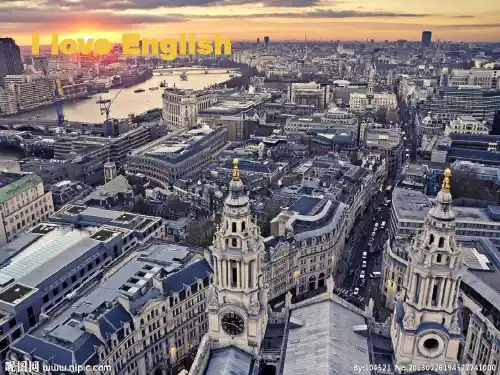
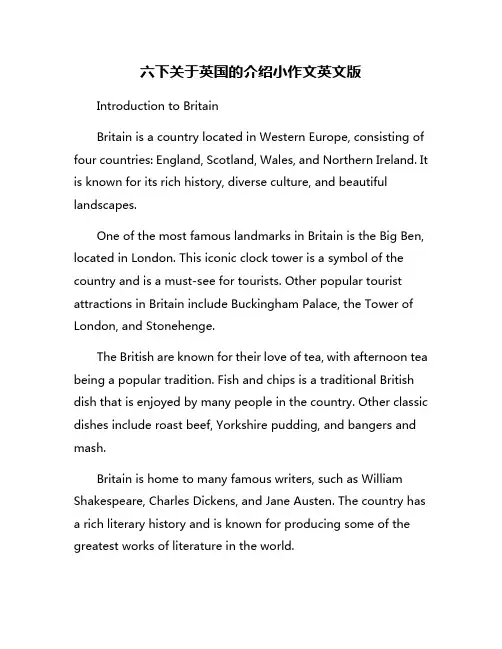
六下关于英国的介绍小作文英文版Introduction to BritainBritain is a country located in Western Europe, consisting of four countries: England, Scotland, Wales, and Northern Ireland. It is known for its rich history, diverse culture, and beautiful landscapes.One of the most famous landmarks in Britain is the Big Ben, located in London. This iconic clock tower is a symbol of the country and is a must-see for tourists. Other popular tourist attractions in Britain include Buckingham Palace, the Tower of London, and Stonehenge.The British are known for their love of tea, with afternoon tea being a popular tradition. Fish and chips is a traditional British dish that is enjoyed by many people in the country. Other classic dishes include roast beef, Yorkshire pudding, and bangers and mash.Britain is home to many famous writers, such as William Shakespeare, Charles Dickens, and Jane Austen. The country has a rich literary history and is known for producing some of the greatest works of literature in the world.The music scene in Britain is also famous, with bands like The Beatles, The Rolling Stones, and Queen originating from the country. Britain is also known for hosting music festivals such as Glastonbury and Reading and Leeds.In terms of sports, Britain is known for its love of football (soccer), rugby, and cricket. The country has produced many famous athletes, including David Beckham, Andy Murray, and Jessica Ennis-Hill.Overall, Britain is a country with a rich history, vibrant culture, and friendly people. Whether you are interested in history, culture, food, or music, there is something for everyone to enjoy in this fascinating country.。
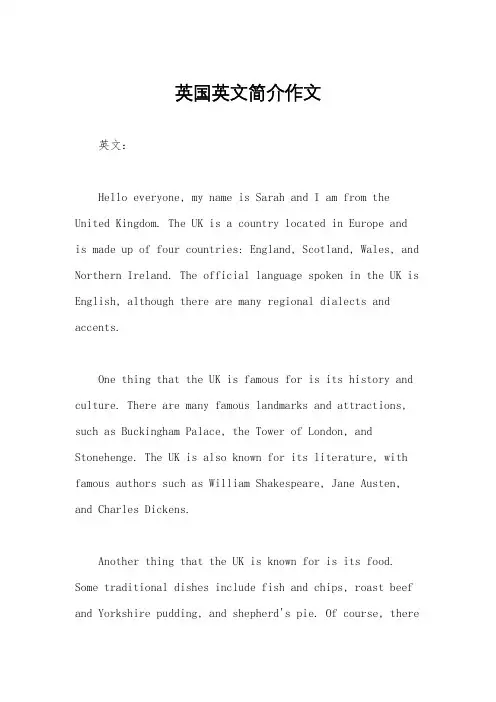
英国英文简介作文英文:Hello everyone, my name is Sarah and I am from the United Kingdom. The UK is a country located in Europe andis made up of four countries: England, Scotland, Wales, and Northern Ireland. The official language spoken in the UK is English, although there are many regional dialects and accents.One thing that the UK is famous for is its history and culture. There are many famous landmarks and attractions, such as Buckingham Palace, the Tower of London, and Stonehenge. The UK is also known for its literature, with famous authors such as William Shakespeare, Jane Austen, and Charles Dickens.Another thing that the UK is known for is its food. Some traditional dishes include fish and chips, roast beef and Yorkshire pudding, and shepherd's pie. Of course, thereare also many international cuisines available in the UK, such as Indian, Chinese, and Italian.In terms of education, the UK is home to some of the world's top universities, such as Oxford and Cambridge. The education system is quite different from other countries, with students typically studying a specific subject indepth at university.Overall, the UK is a diverse and interesting countrywith a rich history and culture.中文:大家好,我叫Sarah,来自英国。
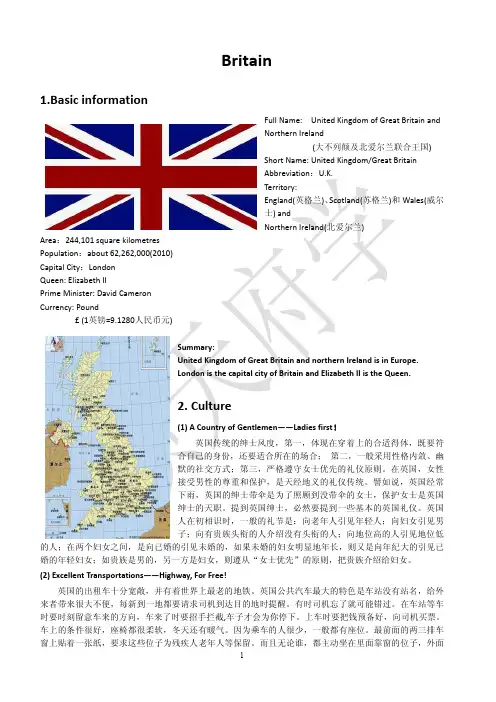
Britain1.Basic informationFull Name:United Kingdom of Great Britain andNorthern Ireland(大不列颠及北爱尔兰联合王国)Short Name:United Kingdom/Great BritainAbbreviation:U.K.Territory:England(英格兰)、Scotland(苏格兰)和Wales(威尔士)andNorthern Ireland(北爱尔兰)Area:244,101square kilometresPopulation:about62,262,000(2010)Capital City:LondonQueen:Elizabeth IIPrime Minister:David CameronCurrency:Pound£(1英镑=9.1280人民币元)Summary:United Kingdom of Great Britain and northern Ireland is in Europe.London is the capital city of Britain and Elizabeth II is the Queen.2.Culture(1)A Country of Gentlemen——Ladies first!英国传统的绅士风度,第一,体现在穿着上的合适得体,既要符合自己的身份,还要适合所在的场合;第二,一般采用性格内敛、幽默的社交方式;第三,严格遵守女士优先的礼仪原则。
在英国,女性接受男性的尊重和保护,是天经地义的礼仪传统。
譬如说,英国经常下雨,英国的绅士带伞是为了照顾到没带伞的女士,保护女士是英国绅士的天职。
提到英国绅士,必然要提到一些基本的英国礼仪。
英国人在初相识时,一般的礼节是:向老年人引见年轻人;向妇女引见男子;向有贵族头衔的人介绍没有头衔的人;向地位高的人引见地位低的人;在两个妇女之间,是向已婚的引见未婚的,如果未婚的妇女明显地年长,则又是向年纪大的引见已婚的年轻妇女;如贵族是男的,另一方是妇女,则遵从“女士优先”的原则,把贵族介绍给妇女。
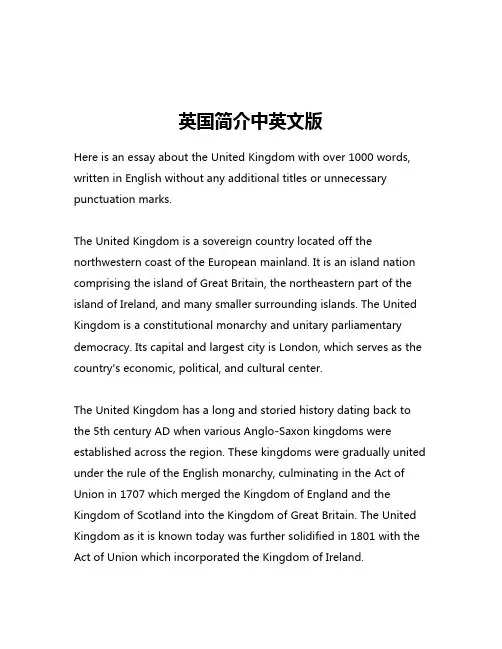
英国简介中英文版Here is an essay about the United Kingdom with over 1000 words, written in English without any additional titles or unnecessary punctuation marks.The United Kingdom is a sovereign country located off the northwestern coast of the European mainland. It is an island nation comprising the island of Great Britain, the northeastern part of the island of Ireland, and many smaller surrounding islands. The United Kingdom is a constitutional monarchy and unitary parliamentary democracy. Its capital and largest city is London, which serves as the country's economic, political, and cultural center.The United Kingdom has a long and storied history dating back to the 5th century AD when various Anglo-Saxon kingdoms were established across the region. These kingdoms were gradually united under the rule of the English monarchy, culminating in the Act of Union in 1707 which merged the Kingdom of England and the Kingdom of Scotland into the Kingdom of Great Britain. The United Kingdom as it is known today was further solidified in 1801 with the Act of Union which incorporated the Kingdom of Ireland.The United Kingdom has played a pivotal role in global affairs for centuries. As the birthplace of the Industrial Revolution, the UK was the world's first industrialized nation and went on to build the largest empire in history, covering a quarter of the global population at its peak. The UK was a leading power in the 19th and early 20th centuries and played a central role in World War I and World War II, emerging as one of the victorious Allied powers.Today, the United Kingdom remains a major global power with a highly developed economy, significant cultural influence, and permanent membership on the United Nations Security Council. It is a member of numerous international organizations including the European Union, the Commonwealth of Nations, the G7, the G20, NATO, and the OECD among others. The UK has a population of over 66 million people and is ethnically diverse, with significant immigrant populations from across the world.The geography of the United Kingdom is diverse and picturesque. The main island of Great Britain is predominantly hilly and mountainous, particularly in the north and west, with lowland areas in the east and southeast. Notable geographic features include the Pennines, the Lake District, Snowdonia, and the Scottish Highlands. The climate is generally temperate, with rainfall distributed throughout the year.The United Kingdom has a highly advanced and diversified economy. It is the sixth-largest economy in the world by nominal GDP and the ninth-largest by purchasing power parity. The service sector dominates the UK economy, accounting for around 80% of GDP. Key industries include financial services, information technology, the creative arts, tourism, and advanced manufacturing. The UK is a global leader in numerous industries including pharmaceuticals, aerospace, telecommunications, and renewable energy.The United Kingdom is renowned for its rich cultural heritage and contributions to the world in fields such as literature, art, music, theater, architecture, and science. It is home to numerous world-famous cultural institutions and landmarks including the British Museum, the National Gallery, the Royal Opera House, Buckingham Palace, and the Tower of London among many others. The UK has produced countless influential writers, artists, musicians, scientists, and public figures over the centuries.The political system of the United Kingdom is a constitutional monarchy with a parliamentary system of governance. The UK has a unitary state with devolved administrations in Scotland, Wales, and Northern Ireland. The British monarch, currently Queen Elizabeth II, is the head of state, while the Prime Minister, currently Rishi Sunak, is the head of government and leader of the party with the most seats in the House of Commons.The United Kingdom is known for its vibrant and diverse society. It is home to people from a wide range of ethnic and cultural backgrounds, with significant immigrant populations from former British colonies and other parts of the world. The UK has a robust system of civil liberties and human rights protections, and is considered one of the most socially progressive countries in the world on issues such as LGBTQ+ rights.In conclusion, the United Kingdom is a highly influential global power with a rich history, diverse culture, and advanced economy. As a member of numerous international organizations and a permanent member of the UN Security Council, the UK continues to play a central role in world affairs. Despite the challenges it has faced in recent years, the United Kingdom remains a dynamic and resilient nation that is deeply respected around the world.。
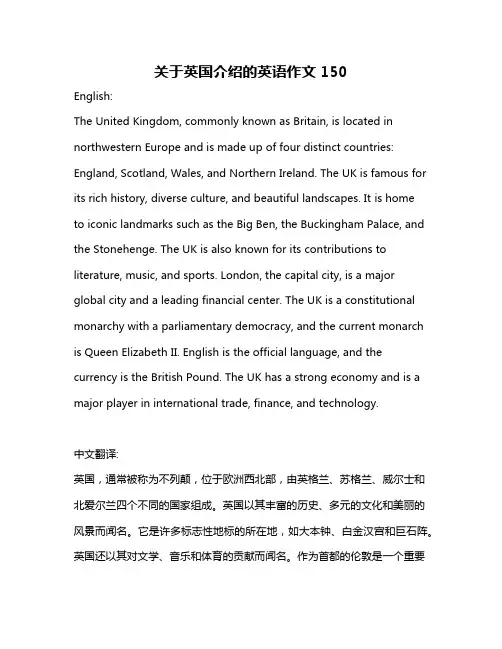
关于英国介绍的英语作文150English:The United Kingdom, commonly known as Britain, is located in northwestern Europe and is made up of four distinct countries: England, Scotland, Wales, and Northern Ireland. The UK is famous for its rich history, diverse culture, and beautiful landscapes. It is hometo iconic landmarks such as the Big Ben, the Buckingham Palace, and the Stonehenge. The UK is also known for its contributions to literature, music, and sports. London, the capital city, is a major global city and a leading financial center. The UK is a constitutional monarchy with a parliamentary democracy, and the current monarch is Queen Elizabeth II. English is the official language, and the currency is the British Pound. The UK has a strong economy and is a major player in international trade, finance, and technology.中文翻译:英国,通常被称为不列颠,位于欧洲西北部,由英格兰、苏格兰、威尔士和北爱尔兰四个不同的国家组成。
英国简介(英文版)A Brief Introduction of the United KingdomThe full name of the country is the United Kingdom of Great Britain and Northern Ireland. It is a complicated name for what is in many ways a complicated country. There?re four parts, England, Scotland, Wales and Northern Ireland, which complete to the set.Here, as follows, are a few aspects of the United Kingdom.1. PoliticsThe Government of the United Kingdom(1) The MonarchyThe oldest institution of government is the Monarchy cruel by the king. This dates back to the Saxon who ruled from the 5th century AD until the Norman Conguest in 1066.The power of the monarchy was largely derived form the ancient doctrine of the …divine right of kings”. It was held that the sovereign derived his authority from God, not from his subjects.While the king in theory had God on his side, in practice even in medieval times it was thought that he should not exercise absolute power.(2) The ParliamentThe word “parliament”comes from the verb “the parley”, that is to discuss or talk. The term was first used officially in 1236 to describe the gathering of feudal barons and representatives from countries and towns which the occasionally summoned if he wanted to raise money.The Great Council came to include both those who were summoned “by name”(the House of Lords) and representativesof communities (the House of Commons). These two houses exist today and collectively we call them the parliament. The Commons quickly gained in political strength. They were willing to help the king by raising taxes and passing laws, but in return they wanted an increasing say in what the king was doing.The parliament became the most powerful institute in Britain was after the Revolutional War.Parliament has a number of different functions. First and foremost, it passes laws. Another important function is that it provides the means of carrying on the work of government by voting for taxation. Its other roles are to scrutinize government policy, administration and expenditure and to debate the majority issues of the day.Parliament is supreme in the British state because it alone has the power to change the terms of the constitution.There are no legal restraints upon parliament. It can make or change laws. Change or overturn established conventions or even prolong its own life withoutconsulting the electorate. However, it does not assert its supremacy, but bears the common law in mind and acts according to precedent..Each Parliament lasts for 5 years.The Upper house has no right to decide, it only has the right to pass the bills passed by the Lower House.The party which holds a majority of those “seats”in parliament forms the government, with its party leader as the Prime Minister. After a government has been in power for 5 years it has to resign and hold a “general election”, in which al British adults are give the chance to vote again for their constituency?s MP. A government cannot stand for longer than 5years except inexceptional circumstances. However, the Prime Minister can call an election sooner than 5years. This can happen when the government loses a “vote of no confidence”in the House of Commons. That is, an MP puts forward a statement for the MPs to vote on sayi ng that “This house no longer ha confidence in the government.”(3) The Political PartiesThere are three major national parties: The conservative party and the Labour party are the two biggest, and any general election is really about which of those two is going to govern. But there?s a third important party, the Liberal Democrats, who usually receive up to about 20% of the votes: not enough to form a government, but enough to have a big impact on which of the other two parties does so.The Labour party is the newest of these three, created by the growing trade union movement at the end of nineteenth century. It quickly replaced the Laberal party as one of the two biggest parties. Labour is a socialist party. That is to say that they believe a society should be relatively equal in economic terms, and the part of the role of government is to act as a “redistributive” agent. The Conservative party is the party that spent most time in power, basically the Conservative are seen as the party of the individual, protecting the individual?s right to acquire wealth and to spend it how they choose , and so favouring economic policies which businessmen prefer, such as low taxes. They receive a lot of their party funding from big companies.2. Religion(1) Queen or king is the leader as well as the bishop of the High Church.(2) 20% of British citizen claims to be Roman Catholics.(3) 40% of Scotland citizen believe in Roman Catholic.(4) Two established churches: Church of London; Church of Scotland.(5) Roman Catholic churches.(6) Free Churches.3. CultureHere, I will emphasis on one aspect of Britain?s artistic output, that for which it is perhaps best known: Literature.⑴Early WritingMuch early British writing was concerned with Christianity: Anglo-Saxons produced beautifully illustrated versions of the Bible: the most famous of these is the book of keels, party written on the Scottish island of lona.⑵Elizabethan DramaThere was a general flowering of cultural and intellectual life in Europe during the 15th and 16th centuries which is known as “The Renaissance”, in British culture one of the most successful and long-lasting expressions of this development lay in drama.⑶18th –century English literature is marked by a rather large shiftfrom the mood and tone of 17th –century literature.⑷The Romantic PeriodRoughly the first third of the 19th century makes up English literature?s romantic period. Writers of romantic literature are more concerned with imagination and feeling than the power of reason, which marked the 18th century.⑸20th Century LiteratureThe 20th Century marked the end of the British Europe, which was replaced by the Commonwealth of Nations. Y et English civilization and culture continue to have a stronginfluence on the rest of the world. The heritage of English literature forms an outstanding part of that culture.20th Century literature can be broadly divided into two stylistic periods: Modernism, and Postmodernism. These periods roughly correspond to literature written after it. Both are characterized by a high degree of experimentation.4. EconomyNational economies can be broken down into three main areas: “primary”industries, such as agriculture, fishing and mining, “Secondary”industries, which manufacture complex goods from those primary products; and tertiary industries, often described as services, such as banking, insurance, tourism, and the selling of goods.Britain?s agricultural sector is small but efficient, producing 58% of the UK?s food needs with only 2% of its workforce. Three quarters of Britain?s land is used for agriculture, with about a quarter of that under crops-wheat and barley are the two commonest. The rest is grazing for animals.The fishing industry provides 55% of the UK demand for fish. Scottish ports land the majority of the fish caught.Energy production is an important part of the UK economy, accounting for 5% of the national wealth.In the secondary sector of the economy, manufacturing industry remains important, producing 22% of national wealth.The service sector of the United Kingdom is dominated by financial services, especially in banking and insurance. London is one of the world?s largest financial centers with the London Stock Exchange, the London international Financial Futures and Options Exchange, and the Lloyd?s of London insurance market all based in the city. It also has the largest concentration offoreign bank branches in the world. 5.British diplomatic affairs (1)Britain?s foreign policies:The contemporary foreign policy of the UK is greatly influenced by its imperial history and also by its geopolitical traits. Perhaps the most important single factor which influences British policy-makers is its history.A second decisive influence upon the way Britain conducts its external affairs is geopolitical. Britain is an island state, and this is considered an important psychological factor as well as one which has influenced Britain?s economic and military development as a nation of seafarers who roamed the globe looking for territory and economic opportunities.How these foreign policies made:The general direction of Britain?s foreign policy is mainly decided by the Prime Minister and Cabinet. The main government department is of course the Foreign and Commonwealth Office, but many other government ministers also play a part in formulating and executing the government?s decisions.The Ministry of Defence is responsible for ensuring Britain?s defence and managing Britain?s involvement in its military treaty commitments. And the Department of Trade and Industry is for the international trade policy and British commercial relations with other countries.(2)Britain and International Institutions:Nowadays its foreign policy is largely shaped by its participation in a number of important international institutions.Britain is one of the five permanent members of the United Nations Security Council, along with Russia, China, the Us and France. It is also the sixth largest contributor to the UN?s budget.As a Security Council member, Britain retains the ability to have a large influence on world affairs. And the more important to Britain today in running of its affairs is its membership in the EU. Britain is also a member of the Commonwealth. Even though Britain granted its colonial territories independence, it continued to feel close to these new countries and wanted to continue to work with them.(3)Security and Defence Policy:Britain depends more on defence than most other advanced industrial countries and maintains larger professional forces. The keystone of British defence policy is its participation in NA TO, which is commonly known as the North Atlantic Treaty Orgnasition. In addition to its NA TO commitments, Britain retains an independent nuclear weapons capability but it is highly unlikely for it to use, or need to use the capability.。
英国国家概况(一)(中英文版)第一章英国的国土与人民第一章Land and People英国的国土与人民I. Different Names for Britain and its Parts英国的不同名称及其各组成部分1.Geographical names: the British Isles, Great Britain and England.地理名称:不列颠群岛,大不列颠和英格兰。
2.Official name: the United Kingdom of Great Britain and Northern Ireland.官方正式名称:大不列颠及北爱尔兰联合王国。
3.The British Isles are made up of two large islands-Great Britain (the larger one) and Ireland, and hundreds of small ones.不列颠群岛由两个大岛-大不列颠岛(较大的一个)和爱尔兰岛,及成千上万个小岛组成。
4.Three political divisions on the island of Great Britain: England, Scotland and Wales.大不列颠岛上有三个政治区:英格兰、苏格兰和威尔士。
(1) England is in the southern part of Great Britain. It is the largest, most populous section.英格兰位于大不列颠岛南部,是最大,人口最稠密的地区。
(2) Scotland is in the north of Great Britain. It has three natural zones (the Highlands in the north; the Central lowlands; the south Uplands) Capital: Edinburgh苏格兰位于大不列颠的北部。
英国介绍英文版作文英文回答:Introduction to the United Kingdom。
The United Kingdom, also known as Britain, is a sovereign island nation located in northwestern Europe. It comprises England, Wales, Scotland, and Northern Ireland. The UK has a rich history, a vibrant culture, and a global influence.Geography and Climate。
The UK is bordered by the North Sea to the east, the English Channel to the south, and the Celtic Sea to the west. The country has a diverse landscape, including rolling hills, mountains, and coastline. The climate is temperate, with mild winters and warm summers.History。
The history of the UK dates back thousands of years, with evidence of human habitation from prehistoric times. The Romans invaded the region in the 1st century AD, and the country was later ruled by various groups, including the Saxons, Vikings, and Normans. The United Kingdom of Great Britain and Ireland was formed in 1801, and the Republic of Ireland seceded in 1922.Politics and Government。
英国的介绍英文简短Introduction to the United KingdomThe United Kingdom of Great Britain and Northern Ireland, commonly known as the United Kingdom (UK) or Britain, is a sovereign country located off the north-western coast of the European mainland. The country includes the island of Great Britain, the north-east part of the island of Ireland, and many other smaller islands. Northern Ireland is the only part of the UK that shares a land border with another sovereign state—the Republic of Ireland. Apart from this land border, the United Kingdom is surrounded by the Atlantic Ocean, with the North Sea to its east, the English Channel to its south and the Celtic Sea to its south-southwest, giving it the 12th-longest coastline in the world.The United Kingdom is a unitary parliamentary democracy and constitutional monarchy. It is a highly developed country and has the world's sixth-largest economy by nominal GDP and eighth-largest economy by purchasing power parity. The UK is considered to have a high-income economy and is categorised as very high in the Human Development Index, ranking 16th in the world. It was the world's first industrialised country and theworld's foremost power during the 19th and early 20th centuries. The UK remains a great power with considerable economic, cultural, military, scientific and political influence internationally.。
abriefhistoryofBritain英国历史简述(精选五篇)第一篇:a brief history of Britain 英国历史简述A Brief History of Britainby Pam BarrettWhen French and British construction workers met beneath the English Channel in 1990, Britain became linked to Continental Europe for the first time in 7,000 years.For it was then, when the last Ice Age ended, that melting ice flooded the low-lying lands, creating the English Channel and the North Sea and turning Britain into an island.This fact of being “set apart” was one of the two seemingly contradictory factors which would affect every aspect of the country’s subsequent history.The other was a genius for absorbing every invader and immigrant, creating a mongrel breed whose energies would establish an empire incorporating a quarter of the population of the planet.Early settlers: Stone Age people arrived, probably from the Iberian peninsula, in around 3000 BC.They lived by farming but left few traces.The most dramatic ancient monument is Stonehenge in Wiltshire, built during the next 1,000 years.How and why it was built was a mystery, but it must have had religious and political significance.The Beaker people, named after their pottery, were next to arrive.But a more importance wave of immigration, in 700 BC, was that of the Celts from eastern and central Europe.The ancestors of the Highland Scots, the Welsh and the Irish, they left behind a rich legacy of intricate and beautiful metalwork.The Romans: British recorded history began when Julius Caesar first crossed the English Channel in 55 BC.Roman rule continued for nearly 400 years, failing to subjugate only Scottish tribes, whose raiding parties were contained by Emperor Hadrian who built adefended wall right across the north of England.Eventually, threatened by barbarians at the gates of Rome, they abandoned Britain, leaving behind them a network of towns, mostly walled, a superb road system, and a new religion, Christianity.The next wave of invaders from central Europe – Angles, Saxons and Jutes – gradually pushed the native Celts west into Wales and north into Scotland.Anglo-Saxon dominance, too, lasted for four centuries, though it did not extend to Scotland, where a separate kingdom was forged by the Picts and the Scots.Although the Anglo-Saxons were a ferocious bunch, constantly squabbling, they laid the foundations of the English state, dividing the country into shires and devising an effective farming system.Their Teutonic religion, worshipping gods such as Woden and Thor, eclipsed Christianity until, at the end of the 6th century, the monk Augustine(once heard to remark “O Lord, make me chaste, but not yet”)converted the kings and the nobles.Monasteries sprang up, becoming places of learning.Treasures contained in the monasteries were a lure for the Vikings, whose ruthless raids from across the North Sea began in the 9th century.Initially they were defeated at sea by Alfred the Great, founder of the British Navy, but eventually they too were assimilated.Canute, the Danish leader, became king of Britain.The Norman Conquest: Links with Normandy, the part of France settled by the Vikings, were strong, and in 1066 William, Duke of Normandy, claimed the English throne.His triumph at the battle of Hastings decisively changed English history.As W.C.Sellar and R.J.Yeatman put it in their classic humorous history 1066 And All That: “The Norman Conquest was a Good Thing, as from this time onwards England stopped being conquered and thus was able to become top nation.”William parceled out the land to barons in return for their loyalty, and the barons parceled out land in turn to lesser nobles in return for goods and services.At the bottom were the peasants, whose feudal status resembled slavery – hence the potency of the Robin Hood legend, celebrating the Nottingham outlaw who stole from the rich to give to the poor.Although much of the Norman kings’ energies were devoted to protecting their borders, there was a great flowering of Norman culture, producing many erudite historians and scholars.In 1167 Oxford University was founded.Thanks to the influence of William Shakespeare’s history plays, much of the next period of English history is popularly remembered through his view of the shifting alliances of the Plantagenet and Tudor kings who ruled from 1154 to 1547.During this period of conflict and disease –the Black Death alone killed nearly half the population in 1348-49 –the royal succession was by no means assured.Power struggles propelled to the throne those who could command the greatest military backing from the majority of the rival barons, a process vividly illustrated by the Wars of Roses, the tussles between the House of Lancaster and York between 1455 and 1485.Frequent strife with France(including the intermittent Hundred Years’ War from 1337 to 1453)dominated international relationships.Internally, Wales was subjugated by 1288, though Scottish independence was recognized when Robert Bruce defeated English forces at the Battle of Bannockburn in 1314.Britain’s most famous king, Henry VIII, is remembered not only for his six wives(two of whom he had beheaded)but also for bringing about the Reformation, making England a Protestant rather than a Catholic countr y.His quarrel centred on the Pope’s refusal to annul his marriage to Catherine of Aragon, who couldnot oblige him with a male heir.Doctrinal differences aside, however, Henry capitalized on a growing distaste for the church’s excessive privilege and wealt h, and was thus able to get away with seizing enough monastic lands and property to finance his rule.Under Henry, Wales was formally united with England in 1536.The Age of Elizabeth: England entered its Golden Age under Elizabeth I, Henry’s daughter by Ann e Boleyn.The Elizabethan Age has a swashbuckling ring to it: the Virgin Queen and her dashing courtiers;the defeat of the Spanish Armada;Sir Walter Raleigh’s discovery of tobacco in Virginia;Sir Francis Drake’s circumnavigation of the world.Poetry, plays a nd pageantry flourished during her 45-year reign.When Elizabeth, the “Virgin Queen”, died without an heir, the throne passed to James VI of Scotland, who became James I of England, inaugurating the Stuart dynasty and effectively joining together the two kingdoms.The Stuart period was one of conflict between Crown and Parliament.James I, a staunch believer in the Divine Right of Kings, would have preferred no Parliament at all, and Charles I dissolved Parliament and initiated an 11-year period of absolute rule.The upshot was a civil war from 1622 to 1649;Charles lost and was beheaded.A period of republicanism followed, under the rule of Oliver Cromwell, but after his death the monarchy was restored and prospered under Charles II.His brother, who succeeded him as James II, was less circumspect and tried to restore absolute monarchy and the Catholic religion.The newly emerging political parties, growing in confidence, forced him to flee and invited his daughter Mary and her Dutch husband, Prince William of Orang e, to take the throne.This “Glorious Revolution”, although bloodless, was nonetheless a revolution and paved the way for Parliament’s permanent dominance overthe Crown.In 1707 an Act of Union united England and Scotland, although Scotland was allowed to retain its own Church and legislature.Many Scots felt that the union was bulldozed through by English politicians’ intent on improving their international trade prospects, and Scottish pressure to unravel the union is still a political issue.Political pragmatism triumphed again in 1714 when, a reliable Protestant monarch being needed in a hurry, a search through the family tree came up with George I of Hanover in Germany.Although he spoke no English and had little interest in his subjects, he founded a dynasty which was to span 115 years and encompass an expanding empire and an industrial revolution.The age of empire: Despite the loss of its American colonies in 1783, Britain’s trade-driven adventurism was undiminished, giving it control of West Africa and India, Newfoundland and Nova Scotia, some Caribbean island, and Australia and New Zealand.At home, farmers embraced more efficient and profitable methods, which led to the eviction of many peasant farmers who either emigrated to the New World, carrying with them a resentment that would bequeathed to future generations, or left the land to find work in the towns, which rapidly became overcrowded.This combination of landowners with surplus capital to invest and laborers in search of a living was one reason why British became the first country to industrialize.Political stability helped too, as did the security of being an island, natural resources, good trade arrangements and a native genius for inventing things.The Scottish inventor James Watt modified and improved the steam engine in the 1770s, opening the way for the efficient powering of trains, ships and factory machinery.The invention of the Spinning Jenny and the power loom created mass production in textiles.The smelting ofiron with coke, instead of charcoal, hugely increased the production of iron.A massive building program of railways, roads and canals created a new class of industrialist, whose fortunes rivaled those of the aristocracy.But it also created abominable working conditions in mines and factories, conditions which led to the slow and painful development of trade unionism.Political reforms, seized elsewhere in Europe by revolution, came gradually in Britain.Parliamentary seats were distributed more fairly among the growing new towns, but voting was still based on property ownership and universal suffrage didn’t come until 1918(and even then was scarcely universal since it excluded women under 30).The problem that dominated parliamentary debate during this period was the intractable Irish Question.The resentment over centuries of British rule in Ireland bubbled to the surface after the potato famines of the mid-1840s, when about 20 percent of Ireland’s population died of starvation and more than a million people emigrated to escape a similar fate.Demands for Irish independence grew but they were demands which many English politicians, conscious of the security problems of having an independent and possibly none-too-friendly neighbor to their west, were reluctant to grant.As with today’s IRA campai gn, the debate had a backdrop of violence.T oday, however, the Victorian Age is remembered as a time of exuberant self-confidence, symbolized by the building in London of the Crystal Palace to showcase Britain’s industrial and technical achievements in the Great Exhibition of 1851.But many of London’s inhabitants might well have wondered when they would benefit from all these accomplishments.For them, the squalor and crime which Charles Dickens portrayed so evocatively in his novels were all too real.Working-class lifeimproved considerably during the last quarter of the 19th century.Many homes had gas lighting and streets were cleaned by the new municipal councils.A new police force contained crime.The music hall provided inexpensive entertainment in towns.Bicycles became a common method of transport, and a trip by train to seaside resorts was for many a highlight of summer.In London, trains in the world’s first underground railway began puffing their way through smoke-filled tunnels between Paddington and Farrington in 1863.Art and drama flourished.By the time of Queen Victoria’s Diamond Jubilee in 1897, the country was feeling quite pleased with itself.Britannia ruled the waves, and anything seemed possible.The 20th century: But all good things come to an end.The Boer War of 1900 ended in victory for the British in South Africa but damaged its international reputation.France, Germany and America were becoming powerful competitors for world markets.The newly united German state was flexing its military muscles.The Edwardian era of the early 20th century, seemingly an idyllic time, was built on shifting sands.Dragged into World War I by a complex web of international alliances, Britain faced unimaginable carnage in which more than a million of its young men died.Social unrest at the end of the war, though less devastating than in the defeated Germany, gave more power to women(who had shouldered a heavy burden while the men were at war)and led to a General Strike by dissatisfied workers in 1926.The Irish Question was partly answered with the creation of an independent Irish free State, but six Protestant-dominated counties in the north stayed under UK rule – a time bomb which exploded in 1969.The shock waves from the 1929 New York Stock Market crash plunged Britain into depression, throwing millionsout of work, especially in the industrial areas of northern England, south Wales and Clydeside in Scotland.The monarchy was rocked by crisis in 1936 when Edward VIII, who had just become king, decided to marry the twice-divorced Mrs Wallis Simpson.His family, the church and the government opposed the match, forcing him to abdicate.His brother, a reluctant George VI, restored the monarchy’s popularity, not least through the support which he and his wife Elizabeth(later the Queen Mother)gave to their subjects during the German air raids of World War II.Although Britain’s island status saved it from invasion, this war involved civilians in an unprecedented way.Cities like Coventry were devastated by bombing and the Blitz radically changed the face of London for the first time since the Great Fire of 1666.Many children were sent to live in the countryside.Most social inequalities were set aside during the war and, when peace returned in 1945, voters turned to the Labour party in hope that it could develop an even greater egalitarianism.It laid the basis of a welfare state, providing free medical care for everyone as well as financial help for the old, the sick and the unemployed.But the war had left Britain broke.While Germany and Japan rebuilt their industries almost from scratch, helped by international aid, Britain was left to patch together a severely damaged economy.It could no longer sustain an empire, and gradually its colonies became independent.Many former subjects, especially from the Caribbean and the Indian sub-continent, settled in Britain, raising fears of racial conflict that, despite some serious tensions, were never(quite)fulfilled.As the austere 1950s gave way to the ’60s, things started to look up.New universities were built, a motorway network launched, and a reinvigorated culture promoted by a group of writersdubbed “the angry young men”.Much of the explosion of new talent came from the north of England: actors like Albert Finney, playwrights like Alan Sillitoe, and pop groups galore, led by the Beatles.The swinging Sixties, powered by a newly affluent youth, had arrived.Britain’s heavy industry might be in trouble, but in fashion and pop music it led the world.The good times died in the 1970s as inflation and unemployment soared and labour unrest led to endless strikes.Joining the European Community in 1973 seemed to produce few obvious economic benefits and revenues from North Sea oil were quickly spent rather than invested.Margaret Thatcher came to power in 1979 promising tough new policies.Her popularity quickly faded, but was revived in 1982 by the Falklands War when an invading Argentinean force was beaten off the South Atlantic islands, remnants of the old empire.Although she went on to win two further elections convincingly, by 1990 her popularity, always firmer abroad than at home, was so shaky that her party, fearing that she would not win them the next election, replaced her with a less combative leader, John Major.He duly won the 1992 election, but a reinvigorated Labour Party under T ony Blair won in 1997.The overall problems did not change, though.The economy remained weak, distrust of the European Community did not abate, nationalism simmered in Wales and Scotland, the conflict in Northern Ireland dra gged on, and the Royal Family’s private life continued to obsess the tabloid press.It was business as usual, in fact – which, in a country obsessed by continuity, was immensely reassuring.第二篇:材料学的历史简述姓名:何莞晨学号:2014012075材料学的历史简述1.按材料划分的时代生活离不开材料,人类的一切生产活动所需的工具都建立在合适的材料的基础上。